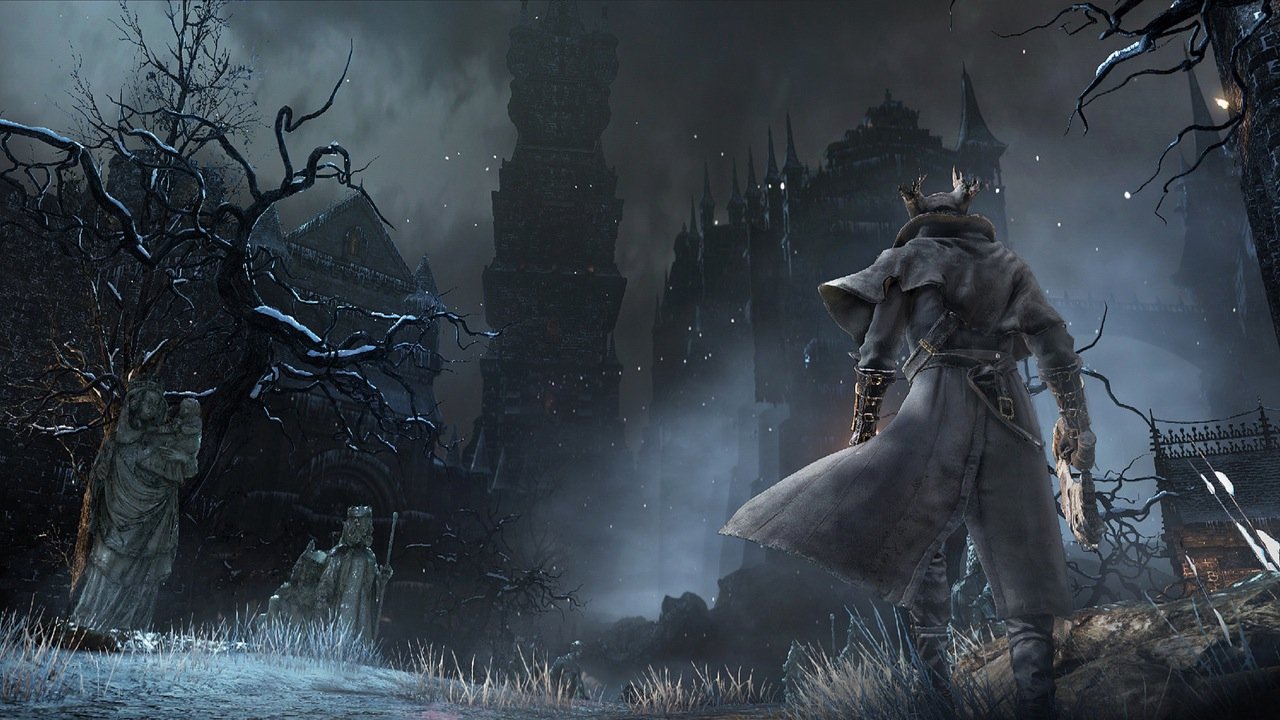I’m probably less than halfway through From Software’s Bloodborne, but I can already tell that it’s something special. Despite having been chewed up and spat out by the intense difficulty of From’s Dark Souls, I’ve finished and very much enjoyed the developer’s other recent titles, Demon’s Souls and Dark Souls II. This said, I’ve obviously come to Bloodborne with some affection for the series it serves as spiritual successor to. I started it up knowing that it would take time to understand its mechanics and to progress very far into its maze-like world. While I suspect many people bought the game with the same level of experience, ready to delve into a confusing and challenging experience, I still tried to imagine how a complete newcomer to From Software’s work would feel about Bloodborne.
It’s been quite a while since I first sat down with Demon’s Souls, knowing only that it was supposed to be as punishingly difficult as it was rewarding. As much as I did come to enjoy the game, discovering for myself that its reputation for meticulous level design and gratifyingly tough combat is deserved, I do remember how repellant its opening hours were. Like Bloodborne, every minor victory—even ones as small as getting from one end of a bridge to another—is hard fought enough that frustration is pretty much inevitable. This is completely fine, of course: part of the appeal of From Software’s titles comes from how they slowly reveal the complexity of their level design and combat systems as the player becomes more skilled. Bloodborne is one of Sony’s biggest exclusive releases, though.
[Bloodborne is] meant to be a mainstream success for Sony even though it, like the Souls games, is a fairly niche experience whose unique design can be off-putting.
While Microsoft has secured rights to games with broad appeal—games like the graphically impressive and easy to understand Sunset Overdrive and Dead Rising 3—Sony has instead gambled on an original title from a developer known for releasing obtuse, tough as nails games. When I bought a copy of Demon’s Souls a year or so after its release, there were plenty of other games to enjoy on the PlayStation 3. It was, at that point, a curiosity published on the console with fairly low stakes. Sony already had a new Metal Gear Solid, Uncharted, and Resistance exclusively available on its system. Demon’s Souls wasn’t a big, heavily publicized release meant to give PS3 owners validation for buying the console—or a high-stakes shot at spurning on a large number of new sales. But this is the kind of position Bloodborne finds itself in. It’s meant to be a mainstream success for Sony even though it, like the Souls games, is a fairly niche experience whose unique design can be off-putting.
Whether exclusively publishing Bloodborne on the PlayStation 4 is good business or not, the risk Sony has taken on the game is worth applauding. In the current, risk-adverse climate of big-budget videogames, green lighting a title based entirely on the track record of From Software and its director Hidetaka Miyazaki shows confidence in original ideas. Sure, there is most definitely a devoted audience eager to play whatever From Software releases, but the crowd likely to buy and evangelize Bloodborne is nowhere near the size of the one that would help spread the word about a great entry to a series like, say, Assassin’s Creed or Call of Duty. From’s games are great, yes, but they aren’t blockbusters in the sense that they’ll appeal to an enormous audience. They’re bizarre and difficult, not exactly the sort of thing that everyone will enjoy. This is why it’s great to see the developer’s latest effort being backed up by a major publisher. Exclusives may be an annoying business practice, but if they have to exist it’s at least heartening to see strange new games benefitting from them.
It’s very easy to imagine none of this happening. Without Sony’s financial support, who’s to say that Bloodborne would have happened? From Software may have ended up getting to work on a Dark Souls III in order to take advantage of brand recognition rather than create something more novel, set in a new world and focusing on new mechanics. Luckily, a publisher gambled on From, taking the fact that the company has reliably produced solid games in the past as a sign that it would do so again in the future. And I’m glad. As great as the Dark Souls games are, Bloodborne is original. It’s exciting not only because it’s a very well made title, but also because it’s something we haven’t seen before. In short, it’s the pay-off to a fantastic risk on Sony’s part.




